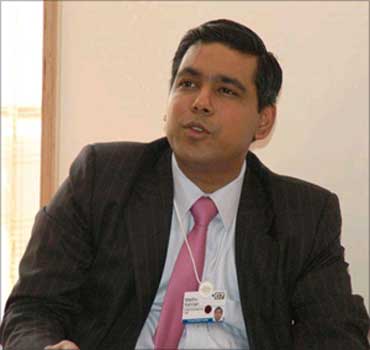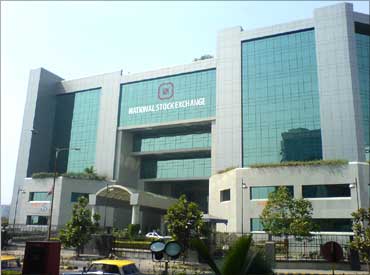
The Bombay Stock Exchange is trying to put in place some building blocks for a new-look institution under Madhu Kannan, MD and CEO. Kannan, 38, has completed a year in his new job and talks about how BSE is ready to take on the National Stock Exchange behemoth and counter new competition. Excerpts:
It has been over 13 months since you took charge and started a revamp exercise. Has it worked?
A national institution like BSE requires an evolving framework and multi-faceted approach. While some changes are public, other facets of our strategy will unfold over a period.
We believe regulatory, technological, distribution-related, innovative (product, processes and technology) and competitive issues will dominate the next decade in the Indian capital markets and our strategy covers all this. Flexibility is needed to take care of other operational and tactical issues.
Our IPO market share has improved significantly. In fact, listing of the Standard Chartered IDR is a testimony to our thought leadership in this area.
More than 75 per cent of companies listing in India select BSE as the designated exchange, due its service-oriented approach. Even in new areas such as mutual fund distribution through stock exchanges, we are dominating.
Going ahead, we have a decisive plan. We are attracting great talent. Top executive (TCS') S Ramadorai joined our board as chairman. He is an institution builder and among technology's pioneers. Ashish Chauhan, who was part of the team that set up NSE, also joined BSE.
He was ranked among the top 50 CIOs in the world by Information Week last year. Given the leadership on technology, BSE's offerings will change qualitatively.
Also, Andreas Preuss from Deutsche Borse has joined and Sanjiv Mishra, the former divestment secretary and Planning Commission member, will join the BSE board. We have a lot of hope from mobile, algorithmic trading and the small and medium enterprise segment. The journey has just begun.
Click on NEXT to read more...

Equity derivatives remains a challenge? The cash market share, too, is not going anywhere.
On derivatives, we are working hard and it has gradually started yielding results. Over 50,000 quotes are now available on the BSE derivatives screen.
It is yet to culminate into more volumes, but we are increasing membership, which will change the scenario significantly. The NSE had almost 40 per cent more active members than BSE and the gap was increasing by at least 10 per cent every year.
However, during our drive, around 230 out of 400 new membership applications are from existing NSE members. Over 1,100 other members have shown interest.
Also, we plan to bring both cash and derivative trading on a single terminal and have already launched a software similar to NSE's NOW. It is easier and cheaper for brokers to connect.
More, before the year end, you will see Sensex futures trading on Deutsche Borse, which will generate institutional interest, too. A fine-tuning of some innovative pricing mechanism is on. BSE's cash market share has stabilised and is not falling further.
A key issue is that the share of algorithmic trading is increasing and BSE is unable to capture it. NSE, a monopoly player, is not allowing algo trade orders to be executed on BSE from those members who use its co-location facility.
There is no inter-exchange operatablity, which is hindering the bringing of more volumes. Once this issue is resolved, cash segment volumes have to rise on BSE.
Click on NEXT to read more...

You think the Sensex (the BSE benchmark) is losing popularity compared to Nifty (of NSE), which is going global?
Plans to list the Sensex on Deutsche Borse are well known. The popularity of Sensex, as a barometer of the economy, is still very high domestically. So, the idea is to make it a tradable product, both in India and globally.
The solution, again, is to have more members, right technology, correct cost structure, which will make Sensex futures a hit.
The process is on and Sensex futures and options will be offered on BOLT soon. Similarly, the exchange framework, especially in the clearing and settlement area, will change, given the regulatory changes expected. We are eagerly observing international trends.
After you cut membership fess, Sebi (the equity market regulator) is planing to hike the net worth criteria for brokers. Would it hurt your drive?
It is only a proposal. More than half our new members are direct members of NSE, with significant net worth. If risk mitigation is the motive to hike net worth, than risk is well managed by clearing and not trading members.
There are structures in place for clearing and settlement risk and for a long time, nobody has heard about a default from a BSE broker.
If more trading members are not enrolled, it would be against the process of financial inclusion. We have seen this in the telecom sector, where in the last five years, penetration has increased from less than five to over 50 per cent, when costs fell and mobile users increased. We will wait for the final report from the Jalan committee to comment.
Click on NEXT to read more...

How has BSE's technology fared after acquiring Marketplace Technology?
Some of Marketplace's big clients include Reliance Money, ICICIdirect, Angel, Motilal Oswal, Anand Rathi Securities, Man Financials, Karvy, Interconnected Stock Exchange, Bangalore Stock Exchange, to name a few.
It has more than 150 customers in various areas in Indian stock markets, which has helped BSE penetrate the technology space, where it had nearly nil presence.
Its front office solution is used by more than 100 members of exchange. It has orders for providing technology solutions by exchanges in India for trading, matching engines, clearing, settlement solutions.
It has a few orders from abroad, too, and we expect significant revenues in coming years from technology and the mobile trading segment.
There are only 15 million demat accounts and over 600 million mobile users, so the future of this segment is bright. We have more than 40,000 direct BOLT terminals and additional approx 150,000 CTC (computer to computer) terminals in India. We plan to increase this by over 100 times in the next five years.
Your CDSL stake hike was controversial. What are your plans?
Controversy was created by specific players only. There was no overall protest from all board members and employees. The main idea is to cut costs, which will benefit end users. Costs can be contained by creating a robust ecosystem and providing an end-to-end solution.
The idea is to have common infrastructure for trading, clearing and settlement and depository, but at the same time, keep them independent in terms of governance and the regulatory framework.
This is the global trend. You don't have multiple televisions to watch different channels. CDSL will have more professionals on board and a new chairman.
Officials at your rival exchange are eyeing the regulator's post. You consider it a threat?
Our motto is to focus on our work. We have excellent relationship with the regulator and will maintain it. If we are focused, it does not matter and within the framework, the regulator is humble.
The growing list of suspended companies is another major problem for BSE. How will you tackle it?
We are working along with the regulator to create a win-win situation for investors and keep in check the manipulative elements.